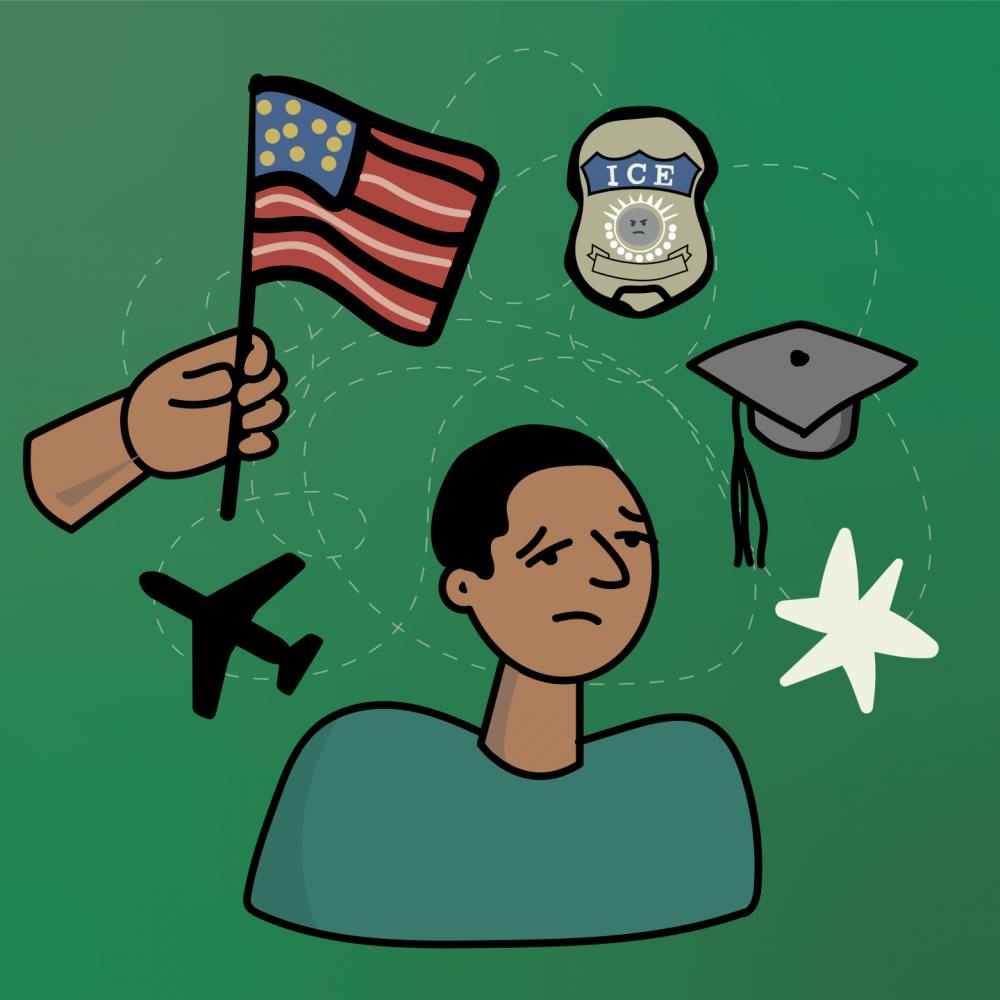
UF has more than 6,700 international students who come from more than 134 countries.
To Alejandro Ortiz, the message is clear: he isn’t wanted in America.
Ortiz, 18, is an incoming freshman from Caracas, Venezuela. Though he’d hoped to attend the university in the Fall, he isn’t sure he’ll be able to now, even virtually.
U.S. Immigration Customs Enforcement announced Monday that international students will only be allowed to remain in the United States if they enroll in an in-person class for the Fall—an option some universities have already ruled out to prevent the spread of COVID-19.
If not enrolled in an in-person course, international students must leave the country or take alternative steps to maintain their nonimmigrant status, like transfering to a school with in-person instruction, according to the Student and Exchange Visitor Program guidelines. (SEVP)
“From a human perspective, I think they’re cruel measures,” Ortiz said. “The message I’m getting from them is that they don’t want us there.”
Members of the UF community have come forward to show their support for international students in the days following the announcement. So much so, that students and a professor have brainstormed ways for them to remain in the U.S. in the Fall, in spite of ICE’s new regulations.
Kyla McMullen, a UF assistant professor in computer and information science and engineering, tweeted that she would like to offer a one credit in-person independent studies course to keep international students at the university.
P.S., she wrote in a subsequent tweet. Attendance is optional.
“I was just thinking back to my time as a grad student and how I had so many friends who were international students,” McMullen said. “If that had happened to me, I would have been devastated.”
She was inspired by Todd Curry, an associate professor of political science at the University of Texas, El Paso, who tweeted a similar message to students one day earlier. In her post, she asked that interested students email her.
The message has been retweeted almost 2,000 times.
McMullen told The Alligator she did not post on behalf of anyone else, or intentionally release a statement ahead of UF—but she didn’t want to sit back and let unjust things happen, she added.
“I'm willing to do whatever it takes to help students stay on campus,” she said.
As of Wednesday, McMullen said 27 students had reached out to her regarding the possibility of her independent course. She also said at least two other UF professors, like Cynthia Barnett, a UF professor of environmental and nature journalism, retweeted their willingness to take the same action.
McMullen said she has PhD students who could be affected by ICE regulations, so she didn’t want to wait. On Wednesday morning, her graduate advisor said that her department and the university are working on the solution.
“I think there’s a solidarity in that we don’t want international students to be deported back home,” McMullen said.
Luke Han, a 19-year-old UF nursing sophomore, is trying to do his part in keeping international students in the U.S., too. On Tuesday, he created a spreadsheet where international students can swap their online classes with the in-person classes of U.S. students, who aren’t at risk of being deported.
Han said he was inspired by similar measures taken by students at other schools to support their international students.
“I don’t really think the announcement is that fair, especially on a really short notice, and it's left a lot of international students without that many options,” Han said.
Durgesh Jha is one of those students. The 20-year-old UF physics and computer science sophomore said he is unsure if he will be able to take an in-person class in the Fall but doesn’t have a way to return home to Tilathi, Nepal, either.
The announcement from ICE included different scenarios for international students: If an international student has been living in the U.S. and their coursework is hybrid (a mixture of in-person and online classes), they can stay, but their coursework cannot be fully online.
This means if UF employs a hybrid curriculum for the Fall semester, international students are required to take classes in the U.S. in person. Only students enrolled at a school that is offering exclusively online coursework can engage in remote learning from their home country, SEVP’s guidelines said.

Jha explained that if he is forced to go home, border closures spurred by COVID-19 may prevent him from returning to Nepal. Once he’s there, the new schedule and environment would pose as additional barriers to his academic success.
International students who are immunocompromised face even greater risk in returning to UF in the Fall, Jha added.
“The announcement adds too much uncertainty and stress when trying to decide about what would be the right thing to do with the pandemic raging on,” Jha said.
Elizabeth Ibarrola, director of immigration concerns with the Alachua County Human Rights Coalition said she thinks ICE is using COVID-19 as an excuse to push people out of the country.
“They know exactly what they are doing to people and they don’t care,” Ibarrola said. “It completely ignores the rest of their [students’] life.”
UF students received an email Wednesday from Joe Glover, senior vice president for Academic Affairs, that said UF is reviewing the revised Fall 2020 schedule in light of the announcement.
“The schedule will allow our international students to have sufficient in-classroom coursework to continue to maintain legal presence,” it said. “We expect to open schedule adjustment for all students this Friday, July 10, and will work with any students (domestic and international) who have concerns.”
The email does not explain the implications of the SEVP changes nor reflects which modality UF is adopting, as in-person or hybrid. It advises students to contact their advisers or the UF International Center.
UF has more than 6,700 international students, coming from more than 134 countries, said Martine Angrand, UF F-1 international student compliance services director.
Angrand did not respond to questions from The Alligator regarding ICE's announcement and UF's plan for Fall 2020 in time for publication.
International students received an email from Leonardo Villalón, the dean of the UFIC, on Tuesday. They are working with UF administration and partner institutions to get clarity on the exact implications of SEVP's new guidelines, it said.
“You, our international students, are core and valued members of our university community. Please know that we are doing our best to help and support you in these difficult times,” Villalón wrote.
Jha hopes as much is true.
“As an international student, I had to work hard to have the chance to go to UF, as equal to any other student who attends,” he said. “But right now, just being an international student makes the accessibility of campus and rational decisions due to COVID-19 safety mutually exclusive choices, and that is very frustrating.”

Anna Wilder is a second-year journalism major and the criminal justice reporter. She's from Melbourne, Florida, and she enjoys being outdoors or playing the viola when she's not writing.

Aurora Martínez is a journalism senior and the digital managing editor for The Alligator. When life gives her a break, she loves doing jigsaw puzzles, reading Modern Love stories and spending quality time with friends.





